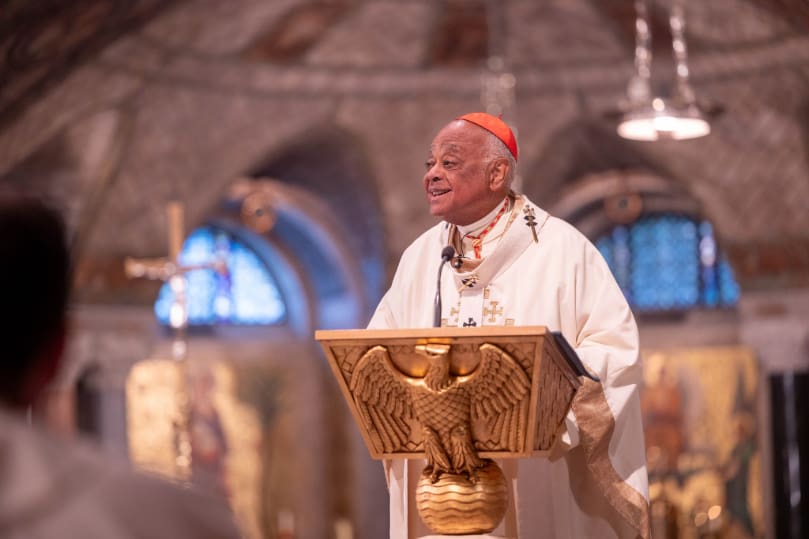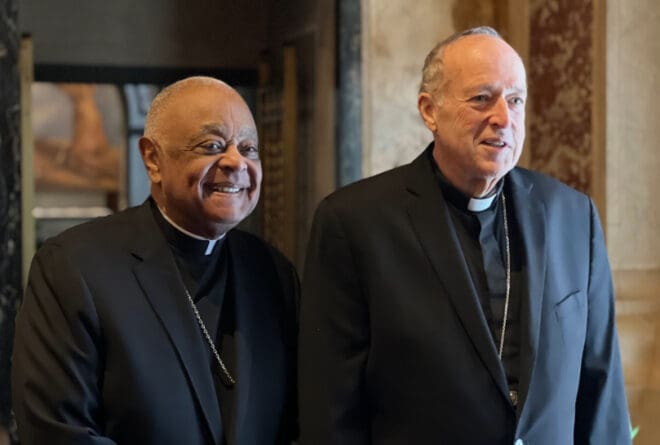 OSV News photo/Mihoko Owada, Catholic Standard
OSV News photo/Mihoko Owada, Catholic StandardCardinal McElroy chosen to succeed Cardinal Gregory as Washington’s shepherd
By GINA CHRISTIAN, OSV News | Published January 6, 2025
(OSV News)–Cardinal Robert W. McElroy of San Diego has been appointed the next archbishop of the Archdiocese of Washington, following Pope Francis’ acceptance of the resignation of Cardinal Wilton D. Gregory, the first African American cardinal, the Vatican announced Jan. 6.
The see city is home to the White House, Congress, Supreme Court and a multitude of embassies, nonprofits, think tanks and lobbying groups seeking to sway the levers of American power.
Canon law required Cardinal Gregory, 77, to submit his resignation to the pope when the cardinal turned 75, which was Dec. 7, 2022. The Vatican announced the news of Cardinal Gregory’s retirement and Cardinal McElroy’s appointment two weeks before the second inauguration of President-elect Donald Trump in Washington.
The 70-year-old Cardinal McElroy–a San Francisco native who pursued degrees at Harvard and Stanford before his 1980 priestly ordination–was appointed as bishop of the San Diego Diocese in 2015. Pope Francis named him a cardinal in 2022. He is also a member of the Vatican’s Dicastery for Laity, Family and Life and Dicastery for Promoting Integral Human Development.
The cardinal has championed Pope Francis’ call to embrace synodality in the Catholic Church. During his time in San Diego, the cardinal convened three synods–the most recent began a process to implement synodal decision-making in the local church. Cardinal McElroy was also a participant in the global Synod on Synodality, which produced a final document on synodality in October that Pope Francis promulgated as magisterial.
As a prelate, Cardinal McElroy has urged the healing of deep polarization in society and in the church. Pastorally, he has called for greater inclusion of those who are marginalized, among them African American and Native Americans, people suffering poverty, migrants lacking legal status, refugees, clergy abuse victims, the incarcerated, and persons who identify as LGBTQ+.
The cardinal has emphasized that a synodal style is key to renewing the church’s missionary spirit and overcoming its internal divisions.
“A culture of synodality is the most promising pathway available today to lead us out of this polarization in our church,” wrote Cardinal McElroy in a Jan. 24, 2023, column for America Magazine. “Such a culture can help to relativize these divisions and ideological prisms by emphasizing the call of God to seek first and foremost the pathway that we are being called to in unity and grace.”
During the U.S. Conference of Catholic Bishops’ most recent annual fall meeting in November, Cardinal McElroy proposed a task force to help implement synodality within the conference. The U.S. bishops approved his proposal in a voice vote.
Cardinal McElroy has also led the San Diego Diocese through a second bankruptcy, for which it filed in June to settle approximately 450 claims. In 2007, prior to his appointment, the diocese paid $198 million to settle claims.
In a June 13 letter announcing the Chapter 11 filing, Cardinal McElroy said, “It is essential that we all keep in mind that it was the moral failure of those who directly abused children and teenagers, and the equally great moral failure of those who reassigned them or were not vigilant, that led to the psychological and spiritual wounds that still crush the hearts and souls of so many men and women in our midst.”
He added, “May God never let this shame pass from our sight, and may God’s tenderness envelop the innocent children and teenagers who were victimized.”
During the 2023 ordination of two auxiliary bishops for his diocese, Cardinal McElroy shared his thoughts on what makes a good bishop. “To be a good bishop,” he said, “you must truly journey with God’s flock as Pope Francis has urged us: walking sometimes at the front to lead; walking sometimes in the middle of the flock to experience the realities of daily life; and walking sometimes at the rear to embrace and walk with those who are struggling to keep up.”
Cardinal McElroy also succeeds a prelate in Washington who leaves an impressive legacy marked by a great many “firsts.”

Washington Cardinal Wilton D. Gregory and Cardinal Robert W. McElroy leave a Jan. 6 news conference at the Cathedral of St. Matthew the Apostle in Washington. That morning, Pope Francis accepted the resignation of Cardinal Gregory, Washington’s archbishop since 2019, and named Cardinal McElroy of San Diego as his successor. As required by canon law, Cardinal Gregory submitted his resignation to the pope two years ago after he turned 75. OSV News photo/Geoffrey Ros, Archdiocese of Washington
Throughout his decades of service to the Catholic Church, Cardinal Gregory has been a pioneering prelate. He converted to the Catholic faith in sixth grade while attending St. Carthage Catholic School in his hometown of Chicago, and was ordained a priest of that archdiocese in 1973.
He became the youngest Catholic bishop in the U.S. at age 34 when he was ordained an auxiliary bishop of Chicago in 1983. In 1994, he was ordained bishop of Belleville, Illinois.
In 2005, he became the third African American to serve as archbishop of Atlanta, an archdiocese that during his tenure grew to some 1.2 million Catholics across 69 counties.
In 2019, he was appointed the first African American archbishop of Washington. Pope Francis elevated him to cardinal in 2020.
During his time in Washington, Cardinal Gregory navigated difficult situations, particularly where faith and politics intersected. The cardinal rejected calls to deny holy Communion to President Joe Biden, the second Catholic to hold the office, despite Biden’s endorsement of abortion, a stance at odds with church teaching. He emphasized the importance of effective dialogue and seeking common ground.
But he also spoke clearly to the president’s shortcomings. In April on CBS News’ “Face the Nation,” Cardinal Gregory said that while he believed that Biden was sincere about Catholicism, “like a number of Catholics, he picks and chooses dimensions of the faith to highlight while ignoring or even contradicting other parts.” He added, “I would say there are things, especially in terms of the life issues, there are things that he chooses to ignore.”
At the same time, Cardinal Gregory–who has consistently spoken out against capital punishment and euthanasia–commended Biden’s recent commutation of most federal death row sentences. In a Dec. 23 statement, the cardinal called the death penalty “one more link in the awful loss of public respect for human life itself.”
Cardinal Gregory was also the first African American elected as president of the U.S. Conference of Catholic Bishops, serving from 2001-2004. Prior to that, he had been elected vice president of the conference (known from 1966 until 2001 as the National Conference of Catholic Bishops) in 1998.
His tenure as USCCB president coincided with the explosive clerical sex abuse scandal in the Archdiocese of Boston. The crisis — while not the first known sex abuse scandal of the Catholic Church in the U.S.–provided the impetus, along with other emerging diocesan abuse scandals at the time, for the U.S. bishops to develop and adopt their “Charter for the Protection for Children and Young People.”
The watershed document that then-Bishop Gregory helped shepherd the U.S. bishops to develop in Dallas June 13-15, 2002–commonly called the Dallas Charter–lays out a comprehensive set of procedures for addressing allegations of sexual abuse of minors by Catholic clergy. The charter also includes guidelines for reconciliation, healing, accountability and prevention of abuse.
As the charter neared its 20th anniversary, Cardinal Gregory told Catholic News Service in a June 2022 interview that the charter marked a “pivotal moment” in the history of the Catholic Church in the U.S. But he said the task of confronting sexual abuse in the church “is not complete.”
“We’ve gone through some rocky patches,” the cardinal admitted. “With every sordid revelation (of sexual abuse or improper response by a bishop), the task becomes more difficult, the climb becomes steeper.”
The cardinal told CNS the Dallas Charter’s impact had at times been undermined by ongoing discoveries of the scope of the decades-long crisis.
“Certainly 20 years ago when the charter was first enacted and ratified, I think the people of God breathed a sigh of relief that finally the bishops were taking action together that would address the issue,” he said. “But … with each revelation that involved a bishop not taking appropriate action, with each revelation that a bishop himself was engaged in this terrible criminal behavior, the progress that was made over months and years was weakened.”
During the Mass for his 2019 installation as archbishop of the nation’s capital, he alluded to another crucial inflection point in the abuse crisis — the lurid abuse and cover-up scandal surrounding Theodore McCarrick, former cardinal and archbishop of Washington, who had been laicized by the Vatican in February 2019 — saying, “We stand at a defining moment for this local faith community.”
Candor, blended with hope, has been characteristic of Cardinal Gregory’s approach to a range of issues within the church.
As a liturgical expert — having earned his doctorate in liturgy from the Pontifical Athenaeum of St. Anselm in Rome in 1980 — the cardinal has written extensively over the years on liturgical challenges and opportunities for growth in the worthy celebration of the liturgy.
In a 2016 journal article, then-Archbishop Gregory noted that “Catholic preaching has often lagged far behind its counterparts in other Christian denominations.” He pointed out that Catholic faithful “seek true inspiration, edification, and sound pastoral direction from the homily at the Eucharistic celebration.”
Writing as a Chicago auxiliary bishop in 1988, he also affirmed that “the cultural accommodation … between the Roman Rite and the Black American cultural heritage” is not “an impossible task” in the realization of an authentic Black Catholic liturgical tradition.
In 1999, then-Bishop Gregory, in his role as vice president of the U.S. bishops’ conference, also publicly apologized to Eastern Catholics, who had historically endured discrimination by some Roman Catholics in North America over their traditions, such as the ordination of married men to the priesthood.
With the start of the 2025 Jubilee Year, Cardinal Gregory expressed the need for both contemplation and hope.
Celebrating a Jan. 1 Mass for the Haitian Catholic community–with the liturgy celebrating the Solemnity of Mary, the Mother of God, while also commemorating Haiti’s Independence Day–the cardinal pointed to Mary as a model for faithful in the journey ahead, especially since she meditated profoundly upon the mysteries of Christ.
“Pondering helps us all prepare to grasp the really important events in life and see their deepest meaning,” Cardinal Gregory said. “We should all reflect more deeply, more frequently during the new year.”
Gina Christian is a multimedia reporter for OSV News. Follow her on X @GinaJesseReina. OSV News Senior Editor Julie Asher also contributed to this report.